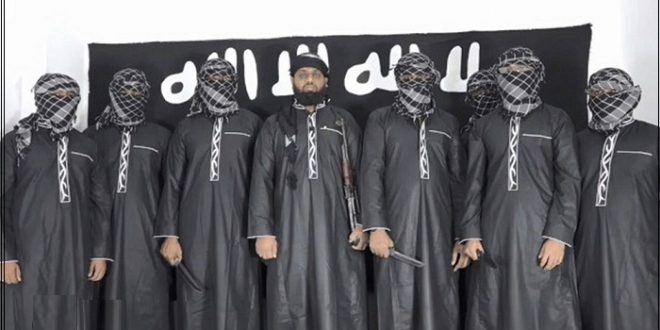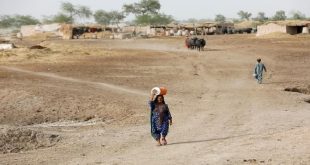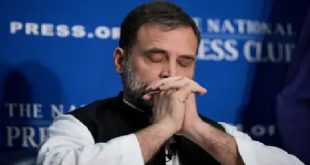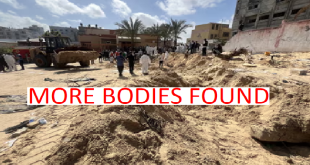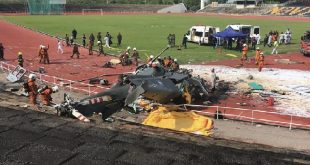By SJA Jafri + Agencies
COLOMBO/MELBOURNE: Sixteen people including six children have died during a Sri Lankan security forces operation in the aftermath of the Easter attacks, as three-cornered suicide bombers blew themselves up and others were shot dead, police have said.
The three men set off explosives, also killing three women and six children inside what was believed to a jihadist hideout near the eastern town of Kalmunai late last night. “Three other men, also believed to be suicide bombers, were found dead outside the house,” police said, adding that they had been shot.
Police backed by troops exchanged fire with those inside the house for over an hour, a military official said, adding that the bodies were recovered early Saturday following a search operation. Early reports suggested as many as 20 people had died.
Security forces have stepped up their searches for extremists after the Islamic State (IS) group claimed responsibility for the suicide attacks on three churches and three luxury hotels, which killed least 370 people and wounded hundreds more.
The joint operation between the police and the army was carried out following a tip-off that those responsible were holed up in a built-up area of Kalmunai, 370km (230 miles) east of the capital.
There were no casualties among the security forces, the police said.
Friday’s clashes came hours after the security forces raided a nearby location where they believe Islamist radicals recorded a video pledge to Islamic State leader Abu Bakr al-Baghdadi before carrying out the Easter bombings.
Police said they found an IS flag and uniforms similar to those worn by the eight fighters for the video before they launched the attacks. The IS released the video two days after the attacks.
The head of a local extremist group, Zahran Hashim, who appeared in the video, was killed at one of the Colombo hotels targeted, the Shangri-La. He was accompanied by a second bomber identified as Ilham Ibrahim.
Authorities had been desperately searching for Hashim after naming his group, National Thowheeth Jama’ath (NTJ), as the perpetrators of the attack, but announced Friday he had been killed in the hotel bombing.
DNA tests were being done on a severed head to conclusively establish it was Hashim’s, officials said.
The government is on the defensive over its failure to heed a foreign intelligence warning that NTJ was planning suicide bombings on churches.
Police chief Pujith Jayasundara became the second top official to resign over the blunders Friday, after top defence ministry official Hemasiri Fernando also stepped down.
Sri Lanka’s Catholic leader, Cardinal Malcolm Ranjith, the archbishop of Colombo, has said he felt “betrayed” by the government’s failure to act on the warnings.
Wickremesinghe apologised on Friday. “We take collective responsibility and apologise to our fellow citizens for our failure to protect victims of these tragic events.”
The military have poured troops onto the streets to back up police as they search for suspects using newly granted powers under a state of emergency. At least 94 people are in custody, including a man believed to be the father of two of them bombers.
Meanwhile, Sri Lankan authorities are searching for about 140 people suspected of links with the Islamic State (IS) group following the deadly Easter Sunday attacks
Sri Lanka’s security forces will conduct a house-to-house search to root out terrorists, the country’s president said on Friday, as the shaken nation grappled with new violence in the aftermath of the blasts.
President Maithripala Sirisena’s comments, in which he also promised a “total reorganization” of the security apparatus were seen as tough talk to deflect criticism of the government’s failure to act on repeated warnings about terrorist attacks but they were also a sign that threat levels remain high across the island nation, and officials have warned that potential suicide bombers could still be planning imminent attacks.
Just hours after the president spoke, security forces conducted at least two raids on the eastern coast, finding explosives and Islamic State flags in one area and facing gun battles and explosions in the other.
“Every household in the country will be checked,” Sirisena said in a meeting at his official residence with the heads of Sri Lankan media organizations, according to a statement released by his office. “The lists of permanent residents of every house will be established to ensure no unknown persons could live anywhere.”
In a nation of about 22 million people, that would require an enormous effort, and the president’s call brought flashbacks of life during Sri Lanka’s 26-year civil war, which ended in 2009. During those years, the security services maintained a pervasive presence in the capital, Colombo, because of threats of suicide bombings by the separatist Tamil Tigers.
The security services made themselves felt again on Friday as agents, with help from the intelligence agencies and several other countries, continued to search for people linked to the bombings, which they say were committed by a radical Islamist group tied to the Islamic State.
 Pressmediaofindia
Pressmediaofindia
